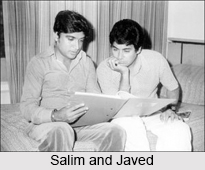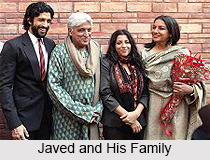 His very name spells romance, intellect and aesthetics. Javed Akhtar, the recipient of the Padma Shri (1999), Padma Bhushan (2007), the Sahitya Akademi Award, has won honour and acclaim as a lyricist, screenplay writer and poet.
His very name spells romance, intellect and aesthetics. Javed Akhtar, the recipient of the Padma Shri (1999), Padma Bhushan (2007), the Sahitya Akademi Award, has won honour and acclaim as a lyricist, screenplay writer and poet.
Early Life of Javed Akhtar
Javed Akhtar was born in Gwalior and is the son of renowned Urdu Poet and film lyricist Jan Nisar Akhtar and Safia Akhtar, who was a writer and a teacher. The tradition of writing goes back to seven generations of writers in the family. The highly respected Urdu poet, Majaz was his mother`s brother and the work of Muzter Khairabadi, his grandfather, is looked upon as a milestone in Urdu Poetry. His parents were professors at the Hamidia College in Bhopal.
Career of Salim and Javed Akhtar
Having come to Bombay, like many other people aspiring to make a mark in the Indian cinema, Javed Akhtar wrote a dialogue (his first movie) only for a meager sum of rupees hundred. Meeting Salim for the first time during the making of the film Sarhadi Lootera was a turning point in the life of Javed Akhtar. After the two of them became friends, they formed a script-writing team that came to be known as Salim-Javed. He was associated with Salim Khan until the year of 1982 (when they had split due to their ego clashes). It was Rajesh Khanna who had offered them their first chance to become screenplay writers by offering them work in his movie "Haathi Mere Saathi". Salim-Javed is considered to be one of the successful scriptwriters of all time in Indian cinema.
Popular works of Javed Akhtar
Along with his erstwhile partner, Salim Khan, he scripted some huge hits like Zanjeer (1973), Deewar (1975), Sholay (1975), Haathi Mere Saathi (1972), Yaadon ki Baaraat (1973), Seeta Aur Geeta (1972), Don (1978) and Trishul (1978). Salim-Javed, as a writer-duo, gave Amitabh Bachchan and Indian Cinema the memorable persona of the `Angry Young Man`.
Salim-Javed parted ways in 1981and since then, Javed has written the scripts of successful movies like Sagar, Betaab and Arjun. Before they had parted, they had written many scripts which were not made into a film. Akhtar took some of the scripts and made hit movies like Zaamane (1985) and Mr India (1987). After scripting a few unsuccessful films like Prem and Khel, he took a break from scriptwriting and concentrated on his role as a lyricist. Some of his best works as a songwriter include Saaz, for which he won the 1996 National Award for Best Lyricist, an award he bagged for three consecutive years- 1996 for Saaz, 1997 for Border and 1998 for Godmother.
Urdu Poetry of Javed Akhtar
Javed Saheb`s first collection of Urdu poetry, Tarkash was released in 1995. It has editions in Hindi as well as Urdu. It has received rave reviews both as a book and as India`s first audio book brought out by Plus Music. The audio book has sold more than a hundred thousand copies. Tarkash has been translated in Bengali by the noted Bengali author Sunil Gangopadhyay. Renowned painter, M.F. Hussain has painted sixteen canvases based on Javed Saheb`s poems in Tarkash. He had also received the Sahitya Academy Award in the year 2013, for his poetry collection named Lava.
Awards and accolades of Javed Akhtar
In 1999, the President of India honoured Javed Akhtar with the title of "Padmashree" for his literary contribution. He has written a large number of poems against Communalism, Social Injustice and National Integration and for Women`s Rights. He composed a song, urging the misguided youth to come forward and build the country, which was declared the National Anthem for Youth by the Ministry of Human Resource Development in 1995. He had also translated few songs written by Rabindranath Tagore in his collection named Anant. He said that “translating Tagore`s poetry was like pouring perfume from one bottle to another without spoiling its essence." Javed Saheb has collaborated with Ustad Nusrat Fateh Ali Khan on Sangam, with Jagjit Singh on Silsilay and with Shankar Mahadevan on his album Breathless. His music album "Tum yaad aaye" was the highest selling non-film album of the year 1997.
According to Javed Akhtar, one should be allowed to write anything (if it makes a proper meaning). This discretion, according to Javed Akhtar, is important for the representation of the imagination in the ignited minds of the new generation. He says that "You can write light hearted songs, but there should be sense in them. They don`t have to be poetic, but they can be written with sensibility and aesthetics."






